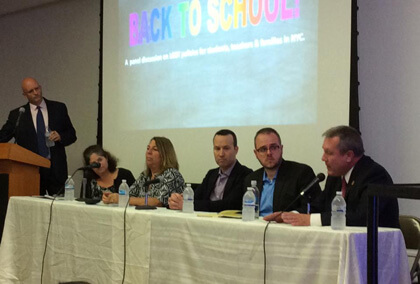A Manhattan trial judge has ruled that the city’s Department of Education did not act arbitrarily in assigning an “Unsatisfactory” rating to a now-retired teacher for confronting a transgender student over her use of a women’s room. New York County Supreme Court Justice Peter Moulton’s April 2 ruling, in a case involving a petition from the former teacher, Deborah Hicks, was published in the New York Law Journal on April 13.
According to Moulton’s opinion, Hicks retired after 28 years of service in the city schools but was appealing an adverse rating in the “Pupil Guidance and Instruction” category from the 2010-11 school year, which was upheld by the department’s internal appeals process. Moulton noted such ratings are subject only to limited judicial review and are upheld unless the court finds that an action was “arbitrary and unreasonable and constitutes an abuse of discretion.” As long as there is evidence supporting the charges, the court does not substitute its judgment for that of the Department of Education.
The charges against Hicks, a special education teacher, included allegations she hugged a 19-year-old male student, kissed an 18-year-old female student, was overheard calling the transgender student “it,” and confronted that student when she tried to use the women’s bathroom, demanding to see a bathroom pass.
Moulton said that the hugging and kissing charges would not by themselves sustain the “Unsatisfactory” rating. Another staff member, a supervising psychologist, said she overheard Hicks calling the student “it,” but Hicks denied that and claimed she had actually stood up for her. On the other hand, Hicks did not deny the incident where she asked for the bathroom pass. For Moulton, that supported the “Unsatisfactory” rating.
“The court will not disturb the credibility findings of the agency,” Moulton wrote. “Even if petitioner demonstrated that she never called the student ‘it’ and that staff was lying, the U Rating is sustainable based on petitioner’s admission that she confronted the student, demanding to see a pass for the women’s bathroom.”
Hicks attached an email to her petition for review that Moulton wrote “lends some support to petitioner’s denial that she called the student ‘it.’ The email reflects petitioner’s concern that the student was bullied by other students, should be referred to as ‘she’ and not ‘it’ and reflects petitioner’s concern that ‘we have to have kids honor gender differences.’” That email, however, was not brought forward during the Department of Education review of Hicks’ case and so could not be considered by the court.
“The agency could have concluded that petitioner was an advocate for the student until the student used the women’s bathroom, which petitioner clearly thought was inappropriate given her demand to see the bathroom pass,” Moulton concluded. “If student gender differences are truly honored, then the student had every right to use the women’s bathroom, and petitioner clearly failed to heed her own words.”
Moulton’s opinion is consistent with a recent ruling by the Equal Employment Opportunity Commission holding that transgender employees are entitled to use the restroom identified with their gender identity.Under rules banning sex discrimination in public schools, transgender students should have the same rights. Unfortunately, this position was rejected by a federal judge in Pittsburgh recently, in a ruling against a transgender man expelled from college for insisting on using men’s restroom facilities.


































